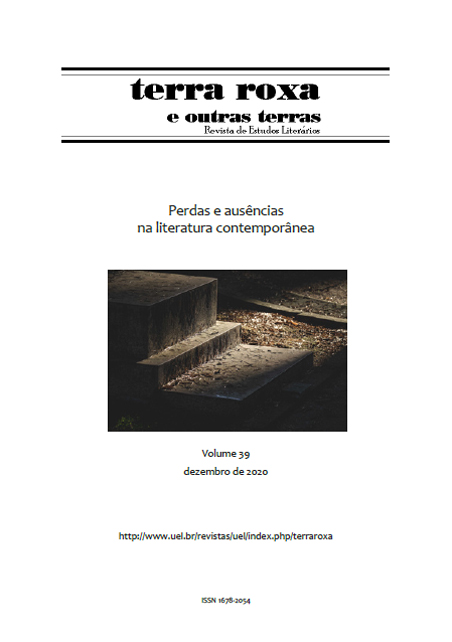A ausência como sentido para o amor em “Uma estrangeira de nossa rua”, de Milton Hatoum
DOI:
https://doi.org/10.5433/1678-2054.2020v39p24Palabras clave:
Ausência, Inexperiência, Amor, MasculinidadeResumen
O presente artigo propõe uma leitura e análise do conto “Uma estrangeira de nossa rua”, de Milton Hatoum (2010), discutindo uma proposta de sentido para o amor como ausência. Para tanto, partimos de conceitos de pensadores contemporâneos, como Zygmunt Bauman (2004) e Pascal Bruckner (2014), que defendem a tese da morte do amor verificada por meio da sua fácil realização. O personagem analisado em questão evidencia uma paixão obsessiva, entretanto, sua falta de experiência impede que ele vá ao encontro do objeto de seu amor. Desse modo, a ausência de experiência, bem como a consequente ausência do amor, no caso do conto, ocasiona um efeito contrário de “morte do amor”, uma vez que pela não sua não realização a paixão permanece viva na mente do personagem. Esse amor vivo se explica, de acordo com a psicóloga Nadiá Paulo Ferreira (2004), como um sentimento de frustração amorosa.Descargas
Citas
BRUCKNER, Pascal. O paradoxo amoroso: ensaio sobre as metamorfoses da experiência amorosa. 2ª. ed. Trad. Rejane Janowitzer. Rio de Janeiro: Difel, 2014
CECCHETTO, Fátima Regina. Violência e estilos de masculinidade. Rio de Janeiro: FGV, 2004.
DEL PRIORE, Mary. História do amor no Brasil. 3ª. ed. São Paulo: Contexto, 2015.
FERREIRA, Nadiá Paulo. A teoria do amor na psicanálise. Rio de Janeiro: Jorge Zahar, 2004.
HATOUM, Milton. A cidade ilhada: contos. Belo Horizonte: Boa Viagem, 2010.
Descargas
Publicado
Cómo citar
Número
Sección
Licencia
Los autores que publican en esta revista aceptan los siguientes términos:
a) Los autores conservan los derechos de autor y otorgan a la revista el derecho de primera publicación, siendo la obra licenciada simultáneamente bajo la Licencia Creative Commons Reconocimiento-No Comercial 4.0 Internacional, permitiendo la compartición de la obra con reconocimiento de la autoría de la obra y publicación inicial en este periódico académico.
b) Los autores están autorizados a asumir contratos adicionales por separado, para distribución no exclusiva de la versión del trabajo publicado en esta revista (por ejemplo, publicar en un repositorio institucional o como capítulo de libro), con reconocimiento de autoría y publicación inicial en esta revista. diario.
c) Se permite y anima a los autores a publicar y distribuir su trabajo en línea (por ejemplo, en repositorios institucionales o en su página personal) después del proceso editorial, ya que esto puede generar cambios productivos, así como aumentar el impacto y la citación del trabajo publicado (Ver Efecto del Acceso Abierto).
d) Los autores de los trabajos aprobados autorizan a la revista para que, luego de la publicación, transfiera su contenido para su reproducción en indexadores de contenido, bibliotecas virtuales y similares.
e) Los autores asumen que los textos sometidos a publicación son de su creación original, asumiendo total responsabilidad por su contenido en caso de objeción por parte de terceros.



















